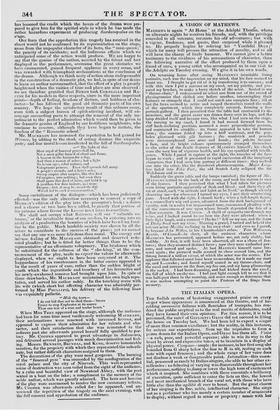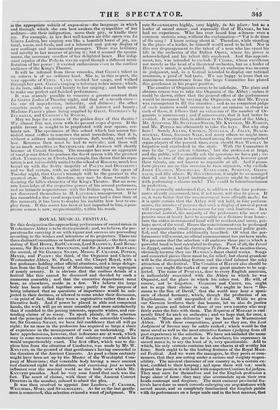THE ITALIAN OPERA.
THE foolish system of bestowing exaggerated praise on every singer whose appearance is announced at this theatre, and of he- ralding successive failures with flourishes of trumpets, has ren- dered the public sceptical as to the real merits of debutantes, until they have formed their own opinions. For this reason, it is to be presunied, the entrii of GiumErrv GRISI did not succeed in filling the house on Tuesday last. We had been led to expect a singer of more than common excellence; but the reality, in this instance, far outran our expectations. Sum up the requisites to form a prima donna for the Italian Opera, and GRISI has them all. Voice —a rich, pure, and powerful soprano; able to win its way to the heart by sweet and expressive tones, or to luxuriate in a display of physical power. Compass—ample ; for instance, in her first song she bounded from G sharp below the line to B in alt, resting on each note with equal firmness ; and the whole range of her voice does not disclose a weak or disagreeable point. Intonation—this essen- tial, possessed so rarely by Italian singers, she adds to her other ex- cellencies: no faltering or varying was discoverable throughout her performance, nothing to,damp or lower the high tone of excitement which it inspired. She combines with these essentials a brilliancy of execution, quite sufficient to enter the lists on this, the lowest and most mechanical branch of the vocal art, with those who have little else than the agilitd di voce to boast. But the great charm of her singing is its fine, noble, intellectual character. She sings not as a performer who has merely a certain number of ornaments to display, without regard to sense or propriety : music with her is the appropriate vehicle of expression—the language in which and through which she can best awaken the sympathies of her auditors—stir their indignation, move their pity, or kindle their joy. For example, in her first well-known air (the opera was La Gaza Ladra), her singing was like a heartfelt burst of joy, na- tural, warm, and fresh, and not a laboured and got-up display of new leadings and instrumental passages. There was brilliancy and novelty in her manner of giving it ; but it seemed the sponta- neous, the necessary overflow of her delighted heart. Her indig- nant repulse of the Podesta was an equal though a different mani- festation of her power : it excited enthusiasm even in the soulless audience of the King's Theatre. It will be inferred from these remarks, that GRISI'S talent as an actress is of no ordinary kind. She is, in this reapect, the very opposite of CINTI. CINTI warbled her songs, and walked through her part. Gat st's singing is tributary to her action; which, in its turn, adds force and beauty to her singing ; and both unite to make one perfect and finished performance. It u as scarcely possible to conceive a greater contrast than La Gazza Ladra of Tuesday night, and that of a month since— the one all imperfection, imbecility, and dulness ; the other complete nearly in every point, full of interest and beauty ; Madame FERON'S place being supplied by Gals', GientLet's by ZUCHELLI, and CURIONI'S by RUBIN!. May we hope for a return of the golden days of this theatre ? We almost fear not, even with its present corps dopeni. if the public favour is sought to be propitiated with new operas, cer- tainly not. The specimens of this school which last season fur- nished must suffice to convince the most incredulous, that it is, without a solitary redeeming exception, dull, trashy, and worth- less. Recourse then must be had to revivals ; and these will be as much novelties as SHAKSPEARE and JoNsoai will shortly become at Covent Garden. The manager has now an aggregate of vocal power fitted to produce the finest operas with the greatest effect. TamBURINI in Uberto, for example, has shown that his repu- tation is not ind issolubly united to the school of Rossi Ni, much less bound up with the frethy inspidity of PICINI and Do:viewer, : and we feel certain, with no other evidence than the opera of Tuesday night, that Geisi's triumph will be the greatest in the greatest style. Much, therefore, may now be done towards re- deeming the fallen character of the King's Theatre. But an accu- rate knowledge of the respective powers of his several performers, and an intimate acquaintance with the Italian opera, have never yet discovered themselves in M. LAPORTE'S management. If he has assembled a fine %mai corps (and he never had a finer than at this moment), it has been to display his inability bow best to em- ploy them. If this secret has been at last imparted to him, a pros- perous season is now, unquestionably, within his reach.





















 Previous page
Previous page